“The Father” (“Bashtata”) (2019). Cast: Ivan Barnev, Ivan Savov, Margita Gosheva (voice), Tanya Shahova, Hristofor Nedkov, Boyan Doychinov, Nikolay Todorov. Directors: Kristina Grozeva and Petar Valchanov. Screenplay: Kristina Grozeva, Decho Taralezhkov and Petar Valchanov. Web site. Trailer.
It can be easy to get stuck. And it can be even easier to allow ourselves to stay stuck. Indeed, in such situations, we can readily convince ourselves that we’re trapped by conditions that can’t be changed, irretrievably ensnared by what cannot be altered. But is that really true? It may be possible to shift our circumstances, but it can take some effort to do so, as a mourning father and son find out in the new Bulgarian dark comedy-drama, “The Father” (“Bashtata”).
Losing a parent can be traumatic enough in itself, but, when the circumstances are compounded by additional complexities, the situation can become that much worse. So it is for Pavel (Ivan Barnev), a successful, middle-aged Bulgarian advertising photographer who travels from his home in Sofia to the remote countryside where he grew up to be with his aging eccentric father, Vasil (Ivan Savov), when his mother, Valentina, dies unexpectedly from a minor operation. However, his gesture of familial support and goodwill quickly becomes more than the dutiful son bargained for.
Vasil, of course, is the challenge that Pavel must contend with. The two have never gotten along well, in large part because of the differences in their temperaments. As a mild-mannered, responsible businessman, Pavel pragmatically takes care of what needs to be done without much grumbling or fanfare, getting things done in a reasoned, methodical manner. By contrast, Vasil, a flamboyant artist known for making grandiose speeches, is prone to impulsive, emotional, sometimes-irrational acts, often intentionally seeking to make himself the center of attention. That’s especially true when he wants to get his way – or when he purposely seeks to humiliate his son, an apparently lifelong practice and one of the reasons Pavel has kept his distance for so long.
[caption id="attachment_11392" align="aligncenter" width="350"]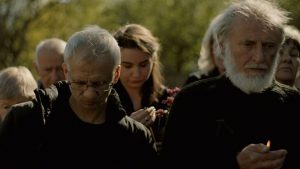 Grieving husband Vasil (Ivan Savov, right) and son Pavel (Ivan Barnev, left) mourn the loss of their wife and mother Valentina in the touching Bulgarian charmer, “The Father” (“Bashtata”). Photo courtesy of Abraxas Film.[/caption]
Grieving husband Vasil (Ivan Savov, right) and son Pavel (Ivan Barnev, left) mourn the loss of their wife and mother Valentina in the touching Bulgarian charmer, “The Father” (“Bashtata”). Photo courtesy of Abraxas Film.[/caption]
When these personalities clash under the trying conditions present here, it’s easy for matters to quickly get out of hand. This becomes apparent right from the outset, when Vasil commands Pavel to take photos of his mother’s corpse in her open casket before she’s laid to rest in the ground, a demand he unsuccessfully tries to resist. The fact that this takes place in the presence of an Orthodox priest delivering a death sermon among a crowd of grieving mourners makes Pavel even more uncomfortable, but Vasil is insistent, concerned only that he be obeyed and not caring about the feelings of others, including his own son.
But it only gets weirder from there. Not long after the funeral, Valentina’s sister, Lyubka (Tanya Shahova), reveals that she received a voicemail message from her not long before she died. It seems that Valentina had something to tell Vasil but was unable to reach him and that she wanted Lyubka to pass along that information to him – but without specifying the nature of the message. Once Vasil learns that, he becomes obsessed with the notion of finding out what she wanted to tell him. He even begins to believe that she’s trying to contact him from beyond the grave, a belief that makes him ever more fixated on trying to make contact with her. And so, with a burst of personal zeal, he decides to pursue that goal in earnest.
Meanwhile, as Pavel watches his father become increasingly untethered, he grows unsure what to do. He needs to get back to Sofia to attend to a major project for one of his clients. He also needs to return to care for his very pregnant wife, Kalina (Margita Gosheva), who phones him frequently and goes through an array of mood swings in his absence. At the same time, though, he feels obligated to keep Vasil from going off the deep end, a prospect that looms ever larger as he grows more preoccupied with making contact with Valentina. And, when Vasil announces his plans to seek the assistance of a charlatan guru whose sanctuary is housed in a former military museum (complete with a model fighter jet atop its roof), Pavel knows it’s time to step in, despite his obligations back at home.
It’s at this point when things go from strange to crazy. The guru’s recommendations send Vasil off on a quest that initiates a cross-country chase between father and son, one that jeopardizes Vasil’s physical well-being, gets Pavel in trouble with the law, prompts Kalina to falsely question her husband’s fidelity when he fails to return home, and, oddly enough, leads to an ongoing search to acquire a supply of homemade quince jam. The raucously funny insanity keeps growing ever more intense and absurd, making it difficult for an increasingly put-upon Pavel to keep up. But, given everything Pavel and Vasil go through, the escapades also serve to soften the strain between them. After all, everything that’s transpiring is related to the loss of a woman they both loved, a ludicrous, arduous and stressful odyssey that begins to bring about developments neither of them expect.
[caption id="attachment_11393" align="aligncenter" width="350"]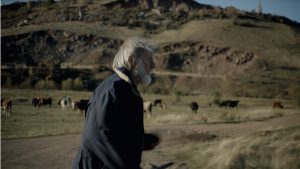 Vasil (Ivan Savov), an aging eccentric father on the run from his pragmatic son, seeks to establish contact with his late wife, resorting to any means to fulfill his quest in the heartwarming and zany Bulgarian comedy-drama, “The Father” (“Bashtata”). Photo courtesy of Abraxas Film.[/caption]
Vasil (Ivan Savov), an aging eccentric father on the run from his pragmatic son, seeks to establish contact with his late wife, resorting to any means to fulfill his quest in the heartwarming and zany Bulgarian comedy-drama, “The Father” (“Bashtata”). Photo courtesy of Abraxas Film.[/caption]
From a purely superficial standpoint, the lunacy of this tale would seem to make little sense. However, on closer inspection, it becomes apparent that all of these supposedly disparate events link together and lead to a resolution that might have been considered wholly improbable from where things began. That naturally begs the question, “How does something like this happen?”
To answer that, one needs to look beneath the surface of what’s transpiring. Father and son have long been estranged, a situation that neither of them probably likes but one that they would also secretly hope to rectify. However, given the protracted stand-off that has existed between them, getting past that hurdle is more than a little difficult. They’re each dug in and undoubtedly believe that a reconciliation is impossible. Those beliefs enable the perpetuation of these circumstances, a result made possible by the conscious creation process, the philosophy that maintains we employ these consciousness tools in manifesting the reality we experience.
Those familiar with this philosophy understand the power and persistence of our beliefs. They often hold on stubbornly, assuring the continuation of what they were intended to materialize. And, in a situation like this, where beliefs in stubbornness are purposely included as part of the mix, is it any wonder that Pavel and Vasil are unable to make any progress toward their hoped-for (but unexpressed) goal?
What makes this process even more difficult is that neither of them is likely aware that the process exists. They’re stuck in their thoughts, unable to move forward. But, if they truly harbor a secret desire for change, they might try to bring it into being in ways that might not appear obvious, since a conscious awareness of that initiative could allow their intractable attitudes to kick in and squelch any efforts aimed at reconciliation. By implementing this process through means that aren’t quite so obvious, they might be able to attain their goal and reach that grand “a ha!” moment while allowing them to save face.
[caption id="attachment_11394" align="aligncenter" width="350"] Pavel (Ivan Barnev), a no-nonsense middle-aged businessman, goes in pursuit of his runaway dad, who’s on a mission to make contact with his deceased wife in the heartwarming and zany Bulgarian comedy-drama, “The Father” (“Bashtata”). Photo courtesy of Abraxas Film.[/caption]
Pavel (Ivan Barnev), a no-nonsense middle-aged businessman, goes in pursuit of his runaway dad, who’s on a mission to make contact with his deceased wife in the heartwarming and zany Bulgarian comedy-drama, “The Father” (“Bashtata”). Photo courtesy of Abraxas Film.[/caption]
This is where this story’s craziness comes into play. The strange incidents that lead Pavel and Vasil from one unexpected development to another manage to take them down a path toward potential reconciliation. The individual events may seem like they’re coming out of left field, but, upon closer scrutiny, they also appear to have an inherent meaningfulness to them. These synchronicities possess a seemingly tailor-made quality, one purposely designed to get our attention; they’re by no means random chance coincidences. And, if we indeed recognize the significance of those incidents, they make it possible for us to consider possibilities that may not have been on our radar, especially those that are intended to bring about important change in our lives, the kind that Pavel and Vasil would probably like to invoke but are too obstinate to admit.
The synchronicities that father and son experience occur frequently. When a synchronicity happens once, it might be easy to dismiss as a fluke. But, when they pop up repeatedly, they become hard to ignore. This happens with increasing frequency during their adventure and in a variety of ways. For example, the story line is rife with missed phone calls, something that might seem a nuisance at first but that eventually serves as a symbolic expression of the rampant miscommunication going on between everyone concerned. If they occur often enough, at some point, someone just might pick up on the significance behind them and seek to address the message they’re designed to impart. Similarly, quince jam may not seem like something of significance in the greater scheme of things, yet references to it keep appearing during the story, prompting realizations whose significance may have otherwise been easily overlooked. Paying attention to the repetition of these seemingly obscure occurrences may lead to meaningful realizations.
As the synchronicities unfold, they often involve acts that appear irresponsible and impulsive, especially on Vasil’s part, and, given Pavel’s penchant for behaving responsibly, such incidents annoy him to no end. However, considering that such developments encourage Pavel to think about things in much-needed new ways, are they really as irresponsible as they might seem? Understanding this is crucial, since responsibility is such a key component in the conscious creation process. Since we create the entirety of the reality we experience, that means we manifest everything that’s part of it, for better or worse. And, because of that, it behooves us to employ our creative powers responsibly – even if some of those manifestations superficially seem irresponsible at first glance. That’s quite a conundrum, to be sure, but, if our materializations help to get us to where we need and want to be – no matter how they appear – we must consider the context in which they materialize and what they ultimately help to engender.
Some of the seemingly impulsive developments that occur during this story involve elements that might be considered supernatural or paranormal, qualities that the more “rational” among us may be easily tempted to dismiss out of hand. However, if we indeed create the totality of our reality, it should follow that this could include elements from across the dimensions as well. So, in light of that, does after-death communication with Valentina really seem all that far-fetched? Admittedly, the form it takes may be more symbolic and less conventional than what we associate with more typical means of communication, but the transmission is nevertheless legitimate and something that is clearly capable of being manifested through the conscious creation process. And, based on the potential goal being sought here, it’s completely plausible that developments such as these can occur in the pursuit of an objective like this.
[caption id="attachment_11395" align="aligncenter" width="350"] Dutiful son Pavel (Ivan Barnev, left) goes to great lengths, including engaging the services of a hearse driver, to find his runaway aging and eccentric dad in the heartwarming and zany Bulgarian comedy-drama, “The Father” (“Bashtata”). Photo courtesy of Abraxas Film.[/caption]
Dutiful son Pavel (Ivan Barnev, left) goes to great lengths, including engaging the services of a hearse driver, to find his runaway aging and eccentric dad in the heartwarming and zany Bulgarian comedy-drama, “The Father” (“Bashtata”). Photo courtesy of Abraxas Film.[/caption]
The foregoing considerations are especially important when we seek to invoke change in our lives. By rewriting our beliefs and keeping the aforementioned notions in mind, we can bring about sought-after results by thoughtfully altering our intentions, even if they don’t necessarily end up taking the form we expect. In these instances, the outcomes can genuinely surprise us when we realize that what we have hoped for has indeed materialized. The impact can be tremendous, even moving mountains that we may have thought were permanently stationary.
One particularly important area where this can be employed is in matters of redemption. This is something that Pavel and Vasil can speak volumes about, especially when it comes to how long it has seemingly eluded them. For years, each of them believed that the other had little to offer – and that it was a situation that would never change. However, through this experience, they have a potential opportunity to discover otherwise. Its materialization may not come about in an expected way, but, in the end, does it really matter how it gets there? What’s most important is that the underlying intent – and the beliefs supporting it – are in place, holding the promise for initiating a new beginning. Talk about something truly miraculous.
This touching charmer, inspired by actual events, examines how a father and son deal with loss while simultaneously sorting out long-simmering differences between them. But don’t let this weighty, reflective premise fool you; while the film has its share of dramatic and emotional moments, it’s also a wildly zany saga that skillfully combines the ridiculous and the sublime. Barnev and Savov play well off of one another in this unlikely road trip/buddy flick, delivering an array of uproarious, contentious and heartwarming moments together. Directors Kristina Grozeva and Petar Valchanov deftly fuse comedy and drama, weaving a captivating tale, one with both raw emotion and ample laugh-out-loud humor. This unexpected gem has primarily been playing the film festival circuit, but it’s well worth catching if you have the opportunity.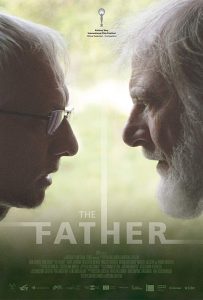
When we’re faced with conditions that we feel can’t be altered, we really need to take a look at what’s preventing that from happening. Sometimes it may be as simple as getting out of our own way, analyzing and changing the beliefs that are keeping us locked in place. The process may not be an easy one, and it could raise some personally uncomfortable issues, but, if we do so, we may find the rewards are well worth the effort. It may help us to see and appreciate the treasures in our lives that we have long overlooked. And, if we do it right, we might even get a little quince jam thrown in for good measure.
Copyright © 2019-20, by Brent Marchant. All rights reserved.
Thursday, March 26, 2020
‘The Father’ seeks to confront what’s thought impossible
Friday, March 20, 2020
This Week in Movies with Meaning
Reviews of "Balloon" and "One Last Deal," as well as movie recommendations for stay-at-home watching, are all in the latest Movies with Meaning post on the web site of The Good Media Network, available by clicking here.
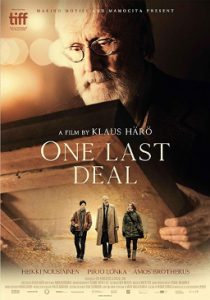


Thursday, March 19, 2020
‘One Last Deal’ examines how to go out on top
“One Last Deal” (“Tuntematon mestari”) (2018). Cast: Heikki Nousiainen, Pirjo Lonka, Amos Brotherus, Stefan Sauk, Jakob Öhrman, Pertti Sveholm, Kristoffer Möller. Director: Klaus Härö. Screenplay: Anna Heinämaa. Web site. Trailer.
When we come into the home stretch of our lives, we hope to settle our accounts, make amends and, one would hope, make a splash while we still can. But that process may prove challenging, especially if we’re loaded down with baggage, have difficulty making changes and come up against unexpected obstacles. Can we persevere under those conditions? That’s the test put to an elderly businessman looking to wind up his affairs in the new Finnish drama, “One Last Deal” (“Tuntematon mestari”).
Aging, ailing Helsinki art dealer Olavi Launio (Heikki Nousiainen) is contemplating retirement but with a definite sense of regret. He’s never achieved the success that he had hoped to attain, mostly selling second-rate pieces from the estate sales of deceased widows with less sophisticated tastes. His cluttered, shabby-looking gallery is filled with unsold works, many of which receive only minimal interest from would-be buyers (and then only from those who are looking to bargain the prices down from what Olavi’s asking). What’s more, Olavi’s business practices are sorely out of date. In addition to having amassed a pile of debts, he’s behind the times in many ways: he keeps all his sales records manually, his client list consists of a ragtag collection of yellowing index cards and he doesn’t even own a computer, something that has caused him to lose out on a lot of sales to online customers. It’s obvious he’s a genuine art lover, but, given how he does business, is it any wonder that he’s barely staying afloat – and that he’s understandably discouraged by his track record?
To make matters worse, the widower doesn’t have much of a personal life. He lives alone, and he has little contact with others, except for a fellow art dealer, Patu (Pertti Sveholm), who faces many of the same business challenges. Olavi’s only family members, his daughter, Lea (Pirjo Lonka), and his sometimes-troublesome teenage grandson, Otto (Amos Brotherus), have little contact with him, mainly because of a lack of support over the years, including during some especially tough times in their lives. He even seems reluctant to help out Lea when she asks him to give Otto an internship to help him fulfill his school’s mandatory job training requirements, a request to which he eventually begrudgingly relents. Indeed, Olavi really is a loner who seems to enjoy his solitude while ironically abhorring it at the same time.
What Olavi wants most at this point in his life is an opportunity for one last big score, one that he believes will help him vindicate his past and allow him to go out on top. And, interestingly enough, just such an opportunity arises when he visits a nearby auction house. While perusing a collection that’s being prepared for auction, Olavi comes upon a portrait of what he believes to be a peasant, a radiant rendering that positively captivates him. However, when he tries to find out more about it, there’s little information available, and the self-absorbed auctioneer (Jakob Öhrman) is disinterested in offering additional help. The painting is unsigned and has been merely attributed to “an unknown master,” but Olavi believes that vague description undersells what it really is.
With Otto’s help, Olavi investigates further. After some dogged, inventive sleuthing, the unlikely duo discovers that the portrait is actually a little-known work by Russian-born master Ilya Repin (1844-1930), a painting from a private collection that was once on loan to a Swedish museum. And, as their research further reveals, the painting is not that of a peasant (one of Repin’s specialties) but, rather, the artist’s depiction of Christ (hence the portrait’s title, Kristus).
[caption id="attachment_11383" align="aligncenter" width="350"] Art dealer Olavi Launio (Heikki Nousiainen, right), and his grandson, Otto (Amos Brotherus, left), investigate the background of an unsigned portrait by an unnamed master to determine its possible worth in the moving Finnish drama, “One Last Deal” (“Tuntematon mestari”). Photo by Cata Portin, courtesy of Making Movies Oy.[/caption]
Art dealer Olavi Launio (Heikki Nousiainen, right), and his grandson, Otto (Amos Brotherus, left), investigate the background of an unsigned portrait by an unnamed master to determine its possible worth in the moving Finnish drama, “One Last Deal” (“Tuntematon mestari”). Photo by Cata Portin, courtesy of Making Movies Oy.[/caption]
Thanks to those revelations, Olavi would appear to have found his goldmine, and, since no one else seems to possess the information he’s uncovered, he would appear to be perfectly positioned to pounce on a bargain. What’s more, to sweeten his prospects, Olavi has a buyer in mind, Albert Johnson (Stefan Sauk), a wealthy Swedish collector of religious art. It would seem as though everything is in place for that big score to hit paydirt.
However, at the time of the auction, the bidding runs higher than expected. Despite his searing desire to come up the winner, Olavi is initially reluctant to make a bid as the price starts to soar. When he finally enters the fray, he’s looked upon as an unlikely bidder, prompting other would-be owners to wonder what he knows, which only serves to drive the price even higher. Yet Olavi remains steadfast, staying in the bidding, despite the price. And, when he eventually comes up the winner, he suddenly finds himself in possession of a painting he can’t realistically afford.
After a painful, emotionally draining process to raise the cash he needs to pay for the portrait, he believes he’s cleared his last hurdle. But, shockingly, more unexpected challenges await, sending even greater shivers down Olavi’s spine. What’s he to do now that he’s sitting on a potential fortune that he cannot capitalize on? That’s what he’s up against as he seeks to complete that final deal.
[caption id="attachment_11384" align="aligncenter" width="235"] Art dealer Olavi Launio (Heikki Nousiainen, left) and his long-estranged daughter, Lea (Pirjo Lonka, right), guardedly seek reconciliation after years of strain in director Klaus Härö’s heartfelt work, “One Last Deal” (“Tuntematon mestari”). Photo by Cata Portin, courtesy of Making Movies Oy.[/caption]
Art dealer Olavi Launio (Heikki Nousiainen, left) and his long-estranged daughter, Lea (Pirjo Lonka, right), guardedly seek reconciliation after years of strain in director Klaus Härö’s heartfelt work, “One Last Deal” (“Tuntematon mestari”). Photo by Cata Portin, courtesy of Making Movies Oy.[/caption]
One can’t help but feel for Olavi. In many ways, he seems like a broken man, both professionally and personally, and the compassionate among us would certainly like to see him turn things around. However, given how the patterns of his life have persisted and the hand he appears to have had in their unfolding, boundless sympathy for his plight might be hard to come by. He truly is an art lover, which is assuredly noble, but he’s apparently been so obsessive about it that he’s been lax when it comes to other areas of his life. In fact, one could even say that he’s been oblivious to his circumstances, such as when he cluelessly asks a financially strapped Lea if she could loan him money to help cover the cost of the Repin portrait.
So how did Olavi get himself into these circumstances? It comes down to where he’s chosen to focus his consciousness, channeling it into beliefs that have effectively given him a tunnel vision perspective on his existence. That may not be a particularly desirable or beneficial outlook, but it’s what he’s drawn into his reality as a result of the conscious creation process, the philosophy that maintains we employ our thoughts, beliefs and intents to manifest the world we experience. And, in his case, it’s an existence with a rather dim and limited worldview. It’s no wonder he feels so unfulfilled.
To his credit, though, at least he realizes this when he envisions the prospect of retirement after a big score, one that he hopes will make up for past failings. The fact that he has come up with this idea, and even shared with Patu, shows that he’s earnestly set the process in motion, even if he hasn’t devised the specific means for making it happen. Nevertheless, the seeds of the notion have been planted, and beliefs aimed at supporting it are coming into being to materialize such an outcome.
Various factors contribute to this process. For example, in manifesting this opportunity, Olavi spends considerable energy tapping into his intuition, one of the elements that figures largely in belief formation. He rightfully suspects that a bright prospect exists somewhere, even if he hasn’t found it. And then, when he sees the Repin portrait for the first time, he’s instantly mesmerized by a painting that hasn’t received much attention from or billing by the auction house. Olavi intuitively recognizes that it’s a special piece, even if no one else does. At this point, the opportunity has successfully materialized, but what comes of it depends on Olavi’s beliefs regarding his ability to capitalize on it. Will he formulate sufficient beliefs that enable him to rise to the occasion?
[caption id="attachment_11385" align="aligncenter" width="350"] Art dealer Olavi Launio (Heikki Nousiainen, left) and his longtime colleague, Patu (Pertti Sveholm, right), face difficult times as their market changes in the moving Finnish drama, “One Last Deal” (“Tuntematon mestari”). Photo by Cata Portin, courtesy of Making Movies Oy.[/caption]
Art dealer Olavi Launio (Heikki Nousiainen, left) and his longtime colleague, Patu (Pertti Sveholm, right), face difficult times as their market changes in the moving Finnish drama, “One Last Deal” (“Tuntematon mestari”). Photo by Cata Portin, courtesy of Making Movies Oy.[/caption]
What happens next depends to a great degree on Olavi’s ability to overcome limitations in his beliefs, to think outside the box. That may be easier said than done, however, given how closed off he has been for much of his life. It’s not impossible, though, especially when inspired by way of example, something that Otto’s presence helps to make possible. Because of the unconventional research methods the teenage sleuth uses, he’s able to verify the painting’s authenticity, something that encourages Olavi to act on his hopes to make that big killing he’s seeking.
Naturally this calls for overcoming fears and living courageously. Olavi certainly has his share of those, given how events in his life have unfolded, both personally and professionally. However, if he truly wants to make the most out of the opportunity that has now presented itself, he must sincerely get past those hindrances if he expects to move forward. He also needs to have faith that circumstances will turn out as they’re supposed to, even when unexpected hurdles reveal themselves. If he allows himself to become discouraged, he’s not likely to arrive where he wants. But, if he believes in the possibility of redemption, especially when it comes to overcoming the fears that have been holding him back, he just might attain his goal.
This moving, heartfelt drama admittedly has some formulaic and predictable elements woven into its narrative, but the intriguing story line and fine performances by its excellent ensemble cast make for touching and engaging cinema. Director Klaus Härö presents viewers with richly layered, multidimensional characters, skillfully fleshed out to a degree not often seen in most contemporary releases. Above all, though, it’s truly refreshing to see a picture that’s both intelligent and emotional at the same time, a testament to the production’s direction and writing. This little-known Finnish offering has primarily been playing the film festival circuit, but it’s definitely time well spent if you get the chance to see it.
[caption id="attachment_11386" align="aligncenter" width="225"] Lea (Pirjo Lonka), the long-estranged daughter of an ailing and aging Helsinki art dealer, seeks to make peace with her father through his acquisition of an unknown work by a Russian-born portrait master in “One Last Deal” (“Tuntematon mestari”). Photo by Cata Portin, courtesy of Making Movies Oy.[/caption]
Lea (Pirjo Lonka), the long-estranged daughter of an ailing and aging Helsinki art dealer, seeks to make peace with her father through his acquisition of an unknown work by a Russian-born portrait master in “One Last Deal” (“Tuntematon mestari”). Photo by Cata Portin, courtesy of Making Movies Oy.[/caption]
When the gate’s about to close, we scurry to get past it before it’s completely shut. That may be a tricky proposition, but we can succeed as long as we’re committed to believing it’s possible and being willing to see it through. And, if we go about it with perseverance and panache, we just might end up with our own work of art.
Copyright © 2020, by Brent Marchant. All rights reserved.
Thursday, March 12, 2020
‘Balloon’ charts the flight to personal freedom
“Balloon” (“Ballon”) (2018 production, 2020 release). Cast: Friedrich Mücke, Karoline Schuch, David Kross, Alicia von Rittberg, Thomas Kretschmann, Jonas Holdenrieder, Tilman Döbler, Ronald Kukulies, Emily Kische, Antje Traue, Till Patz, Ben Teichmann, Elisabeth Wasserscheid, Peter Prager, Nadja Engel. Director: Michael Bully Herbig. Screenplay: Kit Hopkins, Thilo Röscheisen and Michael Bully Herbig. Web site. Trailer.
It’s difficult to stifle our natural tendency to be ourselves, free of the restrictions that limit our personal growth and development. However, efforts to realize the potential behind that can be thwarted when hindrances are intentionally placed before us, keeping us from moving forward. That can become particularly frustrating and burdensome when we allow it to happen, further slowing our progress and perhaps eventually leading to discouragement. Nevertheless, it is possible to overcome such obstacles and live out the life we were meant to experience, a story inspiringly portrayed in the new, fact-based German political thriller, “Balloon” (“Ballon”).
Life under authoritarian East German rule at the height of the Cold War was pervasively difficult, sometimes perilous, for the majority of its citizens. The nation’s secret police – the Stasi – were virtually everywhere, intrusively spying on the public in myriad ways, even for seemingly mundane activities, and doling out severe punishments for what it considered traitorous transgressions. What’s more, the country’s proximity to its democratic neighbor, West Germany, a nation with which it shared numerous cultural and social commonalities, served as a constant reminder of what East Germans were being deprived of under socialism. The freedom of the West was literally so near yet figuratively so far, a constant temptation to those in the East who wanted greater personal liberties, better career and education opportunities, more readily available consumer goods, and easier access to family members from whom they were geopolitically separated. So it goes without saying that there were many who quietly contemplated escape and were willing to risk the danger to attempt it. But those considering this option needed airtight plans if they hoped to succeed, given that failure could easily mean death.
In 1979 in the East German town of Pössneck, not far from the border with the West, two families began work on plans to escape. The Strelzyk family – parents Peter and Doris (Friedrich Mücke, Karoline Schuch) and children Frank and Fitscher (Jonas Holdenrieder, Tilman Döbler) – came up with a novel scheme to flee the tyranny of the East: by quietly floating over the border in a homemade hot air balloon. Working with their friends, the Wetzels – parents Günter and Petra (David Kross, Alicia von Rittberg) and children Peter and Andreas (Till Patz, Ben Teichmann) – the two families clandestinely began constructing their means of escape.
Building the balloon came with more than its share of challenges. For example, the builders had to take ample precautions to make sure their construction materials could not be traced in case any of them were somehow intercepted, something that would almost assuredly prompt Stasi intervention. Even working on the project required care so as not to attract undue attention from officials, such as Erik Baumann (Ronald Kukulies), a “friendly” yet nosy Stasi officer who lived across the street from the Strelzyks. And, then, of course, there was the timing of the escape, which had to be precisely tied to favorable weather conditions (most notably prevailing winds out of the north, a rare occurrence in that part of East Germany). But, despite these conditions, the hopeful escapees carried on, inspired by the promise of what awaited them.
When the time for the flight to freedom came, however, a major hitch was discovered – the gondola was not strong enough to support the weight of all eight passengers. Because of that, the Wetzels chose to back out, but the Strelzyks decided that they hadn’t come this far to give up now, especially when Günter assured them that the gondola would be sufficient to transport four occupants. And so, with a favorable north wind blowing, the Strelzyk family began their courageous journey.
[caption id="attachment_11374" align="aligncenter" width="350"] Peter Strelzyk (Friedrich Mücke, left) hurriedly prepares his homemade hot air balloon for a flight to freedom from socialist East Germany in 1979 in the new, fact-based political thriller, “Balloon” (“Ballon”). Photo courtesy of Distrib Films US.[/caption]
Peter Strelzyk (Friedrich Mücke, left) hurriedly prepares his homemade hot air balloon for a flight to freedom from socialist East Germany in 1979 in the new, fact-based political thriller, “Balloon” (“Ballon”). Photo courtesy of Distrib Films US.[/caption]
Under cover of darkness, the foursome began their flight. The balloon functioned perfectly, but, because there was a risk of being spotted in the night sky, they needed to ascend to a higher altitude to take advantage of cloud cover to conceal their craft. As they rose higher, the clouds provided the necessary camouflage. However, the condensation from the clouds soaked the balloon’s envelope, weighing down the craft and causing it to rapidly descend as fuel was used up more quickly than expected. And, as a result, the balloon came crashing down to earth – just shy of the border.
Trapped still inside the East, the Strelzyks fled the crash site, covering their tracks as best they could to avoid discovery by the Stasi. And, when officials found the debris, they began an intensive inquiry to find the would-be traitors, an operation headed by Lt. Col. Seidel (Thomas Kretschmann), a determined, no-nonsense investigator committed to finding the guilty parties. Meanwhile, Peter, Doris and their children sought to slip back into their daily routine as best they could, constantly looking over their shoulders to see if they were being tailed while searching for alternate ways to escape to the West, such as unsuccessfully seeking assistance from the American embassy in Berlin. But, with the investigatory noose tightening around their necks, the Strelzyks needed to move fast to come up with a new strategy.
Given the success they almost attained with their first flight, Peter and Doris approached Günter and Petra about building another balloon, a bigger and stronger craft capable of supporting all eight passengers. As they discussed the idea with the Wetzels, Peter and Doris learned there was an added incentive for their friends to sign on: With Günter now facing the prospect of his required East German military service, he wanted to get himself and his family out of the country before his time to report. And so, with both families on board, work began in earnest to construct the new balloon on a tight time frame while keeping from being discovered and staying ahead of the ever-intrepid Lt. Col. Seidel.
The outcome of this story, of course, is well known and thoroughly documented in the public record, so a spoiler alert about how events played out is hardly required. In fact, this tale has already been documented once before in the 1982 Disney release, “Night Crossing.” Nevertheless, the odyssey of the Strelzyk and Wetzel families is considered one of the most daring accounts of courage and determination to come out of the Cold War, a true inspiration to anyone seeking the freedom that is our birthright.
[caption id="attachment_11375" align="aligncenter" width="350"] The Strelzyk family (from left, Friedrich Mücke, Karoline Schuch, Tilman Döbler, Jonas Holdenrieder (back to camera)) begins its daring escape from East Germany in a homemade hot air balloon in 1979 in the new, fact-based political thriller, “Balloon” (“Ballon”). Photo courtesy of Distrib Films US.[/caption]
The Strelzyk family (from left, Friedrich Mücke, Karoline Schuch, Tilman Döbler, Jonas Holdenrieder (back to camera)) begins its daring escape from East Germany in a homemade hot air balloon in 1979 in the new, fact-based political thriller, “Balloon” (“Ballon”). Photo courtesy of Distrib Films US.[/caption]
Anyone willing to risk life and limb to escape East Germany at that time had to have considerable drive and ambition – some might say desperation – to attempt it. Given how routinely and thoroughly citizens were being monitored, however, it’s understandable how frantic they were to get away. To make that happen, though, would-be escapees had to come up with strategies that they could realistically and successfully pull off. In short, it called for solid plans they truly could believe in.
Fortunately, there were those – like the Strelzyks and Wetzels – who had the vision to see how to successfully make their exodus. Their scheme was, in many ways, ingenious, a plan made possible by their tautly focused beliefs and their faith in their ability to transform them into tangible results. This is what the conscious creation process makes possible, the philosophy that maintains we tap into these resources to manifest the reality we experience. And, by using this practice to envision their desired outcome, the families moved ahead to see their dream realized.
The oppressive intrusiveness of the Stasi, of course, forced the would-be immigrants to think creatively about their flight to freedom, to come up with a strategy that could slip under the radar of the secret police. Which is what made their plan to use a hot air balloon so inspired; after all, who in their right mind would think of using such an unconventional craft for such a daring getaway? With that in mind, the cautious but hopeful architects of this initiative began their work, growing steadily more confident as they proceeded – even after an initial failure might easily have sapped their enthusiasm and derailed their efforts. That determination to doggedly carry on illustrates the power of our beliefs, especially when galvanized by their steely fortitude to keep moving forward despite the risks and challenges.
[caption id="attachment_11376" align="aligncenter" width="350"] No-nonsense investigator Lt. Col Seidel (Thomas Kretschmann, right) seeks to get to the bottom of an illegal hot air balloon crash in East Germany in 1979 in “Balloon” (“Ballon”). Photo courtesy of Distrib Films US.[/caption]
No-nonsense investigator Lt. Col Seidel (Thomas Kretschmann, right) seeks to get to the bottom of an illegal hot air balloon crash in East Germany in 1979 in “Balloon” (“Ballon”). Photo courtesy of Distrib Films US.[/caption]
Developing this plan would not have happened were it not for its creators’ willingness to think outside of the box. This called for overcoming limiting beliefs to devise something truly inventive, a scheme that provided for their many different needs – a feasible means of transportation, an ability to be executed easily, sufficient flexibility in the face of unforeseen contingencies, and measures that could readily avoid detection, especially given the presence of children who might not be as practiced as their parents in the art of discretion. Coming up with just one of those requirements would have been difficult enough in itself, but concocting a plan that made allowances for all of them indeed took ingenuity – and adequate beliefs to back it up.
Of course, moving ahead with something as audacious as this means pushing aside one’s fears and any beliefs that support them. If allowed to persist, such notions could handily undercut one’s manifestation efforts, keeping desired outcomes at bay. Admittedly, this could be difficult to achieve in an environment where scrutiny and paranoia run rampant, not unlike the conditions the would-be escapees faced under the Stasi. But, if the will to flee is as strong as its adherents claim it is, they must find it within themselves to forge and embrace thoughts centered around courage and heroism. Such beliefs not only help them to achieve what they set out to do, but they also reinforce their efforts along the way, providing an impetus to strive onward toward accomplishment.
What’s most important in all this, though, is the inspiration that the creators’ efforts engender, both among themselves and as examples to others. Considering the harrowing conditions that the Strelzyks and Wetzels were up against, onlookers would likely be hard-pressed to feel sympathy for those with lesser challenges who woefully bemoan their circumstances. Given their plight, it’s truly astounding what the East German runaways were able to accomplish. They genuinely serve as beacons of hope to anyone seeking to attain sought-after goals under pressing conditions. Indeed, if they can do it, so can we.
[caption id="attachment_11377" align="aligncenter" width="350"] After an initial failed attempt at escaping East Germany in a homemade hot air balloon in 1979, eight courageous individuals try again in a second attempt as depicted in the new, fact-based political thriller, “Balloon” (“Ballon”). Photo courtesy of Distrib Films US.[/caption]
After an initial failed attempt at escaping East Germany in a homemade hot air balloon in 1979, eight courageous individuals try again in a second attempt as depicted in the new, fact-based political thriller, “Balloon” (“Ballon”). Photo courtesy of Distrib Films US.[/caption]
Not to be confused with the Chinese cinematic fable of the same name, “Balloon” presents a gripping saga of the two families and their heroic venture. This fact-based German political thriller effectively captures the pervasive sense of fright that everyday citizens felt under the scrutiny of the Stasi just in going about their regular routines, let alone in attempting such a bold feat as this. While the picture occasionally overdoes it in its efforts to create dramatic tension, it nevertheless conveys an otherwise-authentic feel of what it was like to live under such stressful conditions – and the desperation to escape it and find a life of freedom. This is rock solid thrill-ride entertainment at its best with a hefty dash of inspiration thrown in for good measure. “Balloon” has primarily been playing the film festival circuit, but a wider theatrical release is in the works.
The price of freedom is sometimes a high one, as the characters in this film come to discover for themselves. However, when the rewards it offers are taken into account, it’s a ticket well worth the admission cost. Their value becomes ever sweeter when experienced firsthand, enabling us to tangibly enjoy what we may have only once dreamed about. And there’s no hot air in that.
Copyright © 2020, by Brent Marchant. All rights reserved.
Sunday, March 8, 2020
This Week in Movies with Meaning
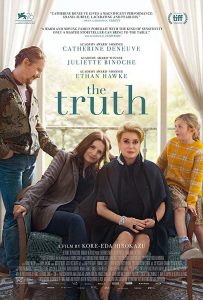
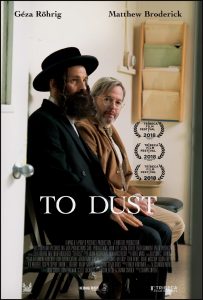


Saturday, March 7, 2020
‘Babyteeth’ explores the choices of an uncertain future
“Babyteeth” (2019). Cast: Eliza Scanlen, Ben Mendelsohn, Essie Davis, Toby Wallace, Emily Barclay, Andrea Demetriades, Eugene Gilfedder. Director: Shannon Murphy. Screenplay: Rita Kalnejais. Play: Rita Kalnejais, Babyteeth. Web site. Trailer.
If you were up against your own mortality, how would you spend your time? That question might be a little easier to answer for someone who’s somewhat on in years and who has the benefit of a wealth of life experience to draw upon. But, for someone lacking such insight, that decision might be a little more difficult to make; you know you want to get something in under your belt with the time that remains, but the choices may not be readily apparent, given that you’ve never been through them before and that you don’t know how long you have. Some of those choices might even appear questionable or objectionable to onlookers and those who care about you, options that could be roundly discouraged. Nevertheless, you move ahead anyway, as best you can and as best as you see fit, a journey that might prove to be a joyful ride, a rocky road or perhaps both, the kind of challenge faced by an adolescent living under such circumstances in the enigmatic new comedy-drama, “Babyteeth.”
Australian teenager Milla Finlay (Eliza Scanlen) leads a somewhat challenged life. Many of her peers at a private school in suburban Sydney see her as offbeat and kinda geeky, a promising violin virtuoso who’s not exactly one of the hippest kids in her class. But there’s more to it than that; in a number of ways, she’s not quite as grown up as many of her classmates. She even possesses one of her baby teeth, a rather unusual condition for someone her age. However, if all that weren’t enough, Milla is undergoing treatment for an undisclosed form of cancer, one that often leaves her drained, not to mention embarrassed by the side effects that accompany chemotherapy, such as hair loss.
[caption id="attachment_11364" align="aligncenter" width="350"] Because cancer-stricken Aussie teenager Milla Finlay (Eliza Scanlen) faces an uncertain future, she seeks to take in as much of life as possible, even pursuits of a questionable nature, during what time she has in the new comedy-drama, “Babyteeth.” Photo courtesy of IFC Films.[/caption]
Because cancer-stricken Aussie teenager Milla Finlay (Eliza Scanlen) faces an uncertain future, she seeks to take in as much of life as possible, even pursuits of a questionable nature, during what time she has in the new comedy-drama, “Babyteeth.” Photo courtesy of IFC Films.[/caption]
Nevertheless, Milla strives to cope, wrestling with all of the awkwardness that comes with adolescence, her own particular challenges aside. And, as quickly becomes apparent, given her uncertain future and despite her social clumsiness, she’s not afraid of trying out new things as a means of finding her own way, no matter how successful she is at dealing with them. That’s perhaps best exemplified by the spontaneous relationship she strikes up with Moses (Toby Wallace), a 23-year-old small-time drug dealer and occasional user who takes a shine to 16-year-old Milla. In many ways, though, they seem a mismatched couple; given their age difference, Moses has more worldly experience than Milla, which periodically causes him to lose patience with her, even going so far as to ditch her when things become tiresome or he sees it as convenient. Such incidents can lead to expected heartache, as well as serious and potentially dangerous complications. But, despite this sometimes-shoddy treatment, Milla basks in whatever attention he provides, which makes her feel better, especially when the debilitating effects of her illness overwhelm her.
Needless to say, this relationship doesn’t sit well with Milla’s parents, Henry (Ben Mendelsohn), a psychiatrist, and Anna (Essie Davis), a former music prodigy-turned-stay-at-home mom. But, then, they should be careful about pointing fingers given their own questionable behavior. Anna is often strung out on all manner of prescription medicines (prescribed by her husband no less), while Henry is having a less-than-platonic relationship with his young, new, pregnant neighbor (Emily Barclay). Oh, and Henry and Anna have more than their share of emotional clashes, making any of their daughter’s conflicts with Moses look pale by comparison. However, given their awareness of Milla’s condition and a vague appreciation of the bad examples they set, mom and dad avoid hypocrisy by cutting her a great deal of slack and allowing her to have her fun, no matter how much they detest the guy she’s seeing.
As their on-again/off-again romance unfolds, Milla and Moses somehow manage to undergo a fair amount of personal growth, both as individuals and as a couple. Milla’s first love experience may not be perfect, and Moses may be far from the ideal mate, but they share an undeniable, if inexplicable bond. Perhaps it has to do with the fact that, given their respective circumstances, neither of them probably expects to be around for long, so they grab at what life has to offer while they have the chance. It’s not as if they’re checking off items on a bucket list, but they seem eager to freely engage in whatever life experience strikes their fancy at the moment; after all, they may not have many opportunities to pursue such adventures. And, as they partake in these exploits, they aim to get the most out of them, no matter how unusual or unacceptable they might seem to others, particularly Henry and Anna.
[caption id="attachment_11365" align="aligncenter" width="350"] First love takes an unexpected form for cancer-stricken Aussie teenager Milla Finlay (Eliza Scanlen, left) when she falls for Moses (Toby Wallace, right), a small-time drug dealer and occasional user seven years her senior, in director Shannon Murphy’s impressive debut feature, “Babyteeth.” Photo courtesy of Whitefalk Films.[/caption]
First love takes an unexpected form for cancer-stricken Aussie teenager Milla Finlay (Eliza Scanlen, left) when she falls for Moses (Toby Wallace, right), a small-time drug dealer and occasional user seven years her senior, in director Shannon Murphy’s impressive debut feature, “Babyteeth.” Photo courtesy of Whitefalk Films.[/caption]
In many regards, this scenario might sound heartbreaking, and, admittedly, there is a discernable undercurrent of sadness that runs through the story. But there are also joys to be had, such as the thrills of first love, exhilarating escapades and loads of laughs, many of a decidedly quirky nature. Their ups, downs and adventures remind us all of the rich panorama of experience life has to offer and the ultimately all-too-finite windows in which we have to enjoy it, opportunities that are considerably shorter for some of us than for others. For someone seeking to literally and figuratively shed her remaining baby teeth, such a quest may prove to be more urgent than many of us realize or can appreciate. Carpe diem, indeed.
To an outside observer, many would probably look upon Milla’s circumstances and say that she got a raw deal. They might add that she’s fortunate to come from a contented middle class background, one that has provided her a comfortable home, seemingly adequate health care, and loving and supportive (if challenged) parents. But, then, they also might wonder why she’s potentially risking all the blessings she has by pursuing a seemingly hopeless relationship with a walking train wreck. Indeed, is it wise to jeopardize what she has going for her by hanging out with someone who’s steps away from rehab or a jail cell?
Considering how long Milla’s seemingly been a nerd and given the ticking clock she might be up against, is it any surprise that she wants to get in some thrills while she has the chance? In his own way, Moses makes that possible, and, if that’s what she wants, should anyone realistically deprive her of that? For what it’s worth, there may be valuable life lessons for her in such an involvement, questionable though it may be. So is it fair to deny her that just because it’s related to circumstances that others might find objectionable?
[caption id="attachment_11366" align="aligncenter" width="350"]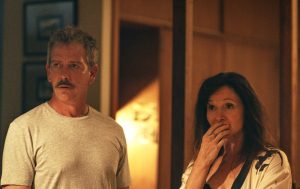 Distressed parents Henry and Anna Finlay (from left, Ben Mendelsohn and Essie Davis) worry about their teenage daughter’s health and questionable choice in boyfriends in the moving new comedy-drama, “Babyteeth.” Photo courtesy of Whitefalk Films.[/caption]
Distressed parents Henry and Anna Finlay (from left, Ben Mendelsohn and Essie Davis) worry about their teenage daughter’s health and questionable choice in boyfriends in the moving new comedy-drama, “Babyteeth.” Photo courtesy of Whitefalk Films.[/caption]
Admittedly, this is a thorny question, but, for better or worse, this is what Milla believes she needs at this time in her life. And, for her part, she has successfully managed to draw these circumstances to her through the conscious creation process, the philosophy that maintains we employ these metaphysical tools in manifesting the reality we experience. Even if Milla has never heard of this practice, it’s nevertheless apparent that she’s quite adept at working with its principles.
This is not to suggest that Milla wants to end up in the gutter, nor is that something to be condoned. After all, she still seems to want many of the things teenagers typically desire – shedding the naïveté of youth, finding ways to fit in (especially with the cool kids), attending her school formal and experiencing love (in all its forms) for the first time. She just seems to be following her own path on her way to discovering these things for herself. How can any of us derail her efforts at that?
Milla goes through many, many changes while on this odyssey. That’s to be expected in a “normal” adolescence, let alone one characterized by the singular issues she faces. But, then, such is the case during an age of personal discovery. It’s also in line with one of conscious creation’s core concepts – that everything is in a constant state of becoming. Milla’s just being true to this stage of life and to this metaphysical principle. So, given what she’s going through, the best that anyone can do for her is to leave her be.
In making her way through these myriad changes, Milla comes up against a host of fears and limitations, all of which she handles in her own way, admittedly with varying degrees of success. Given what she’s up against, this can’t be easy at times. Considering her health challenges, the quiet disapproval of her parents and the typical angst teens generally face, it’s a lot to tackle and overcome. What’s most important, though, is that she makes the effort to do so, a key capability for becoming an effective conscious creation practitioner – and in manifesting a satisfying and fulfilling existence, something at which many of us often come up short.
[caption id="attachment_11367" align="aligncenter" width="350"] Music lessons help provide a sense of direction and purpose for cancer-stricken Aussie teenager Milla Finlay (Eliza Scanlen) in “Babyteeth.” Photo courtesy of Whitefalk Films.[/caption]
Music lessons help provide a sense of direction and purpose for cancer-stricken Aussie teenager Milla Finlay (Eliza Scanlen) in “Babyteeth.” Photo courtesy of Whitefalk Films.[/caption]
Under these conditions, Milla’s efforts are to be applauded, not criticized. In fact, this scenario in many respects calls to mind the Biblical passage about he who is without sin casting the first stone. Henry and Anna’s disapproval of Milla’s behavior comes as somewhat ironic in light of their own questionable antics. Maybe those who are supposed to be providing guidance to the impressionable can indeed learn something from those whom they’re supposed to be guiding. This can lead to a variety of valuable new revelations for the mentors in such areas as tolerance and compassion. Such an insight becomes abundantly apparent, for example, during one scene in which Milla pleads with Henry to graciously set aside his prejudices and extend these qualities to Moses, something she’s more than willing to do in light of the fact that she can empathize with his situation in a way that her dad perhaps can’t. That sounds pretty grown up for someone who’s still on the verge of adulthood – and who has the wisdom to share her understanding with those who have already arrived there (and theoretically should know better).
Indeed, who says youth doesn’t know anything? When someone is faced with the prospect of having to fit a lifetime of experience into a potentially shorter time frame than most of us typically do, it can prompt one to grow up a lot faster than usual. Milla’s choices might not be the same as those we’d make, but she introduces us to possibilities that we would not ordinarily consider. It’s an example we could all learn from.
“Babyteeth” is far from the typical teen health crisis picture, mainly because it doesn’t dwell on the protagonist’s illness. Instead of presenting a story about an adolescent wrestling with disease, the film tells the tale of a teenager struggling to grow up who just happens to be sick. By presenting Milla’s story from this perspective, director Shannon Murphy defies expectations as she attempts to depict a challenge common to many of us that just happens to have an additional component appended to it, an approach that strives to portray the struggle to carry on and that ultimately serves to heighten the film’s emotional impact. To be sure, Milla’s illness is always lurking in the background, but the picture is more about life (and what we do with it) than about how much time we spend undergoing medical procedures that may or may not prove successful.
With a tautly written script, a superb ensemble cast (including Mendelsohn and Davis in some of their best performances) and a more than ample supply of supremely quirky humor, this excellent debut feature from filmmaker Murphy ushers the audience through a minefield of emotions (especially in the film’s concluding sequence), leaving viewers moved – and drained – by picture’s end. Admittedly, it may seem like the picture meanders at times (and, in fact, it occasionally does), but it’s a film that leaves viewers wondering what’s going to happen and evoking emotions in line with that, yielding reactions that are legitimately earned and not manipulated. Think of this as a slightly off-the-wall, bittersweet and decidedly more dysfunctional version of “Terms of Endearment” (1983), with elements of “Me and Earl and the Dying Girl” (2015) thrown in, and you have the idea. This is indeed an impressive offering from a promising new talent. Don’t miss it.
“Babyteeth” has primarily been playing at film festivals, and it will be screening at a few more. However, a general release appears to be in the offing sometime in the near future. Look for it at theaters and institutions that specialize in arthouse and independent cinema.
Many of us would no doubt like to live forever, even though most of us fully know that’s impossible. But, that aside, we nevertheless would at least like to have a long and fulfilling life, one that provides us a richness of experience and personal satisfaction. When it appears we might not get it, though, we must decide what to do with what’s available, no matter what the parameters of that opportunity might be. Under such circumstances, we could second-guess ourselves until the time runs out, which certainly doesn’t seem like a viable option. Or we could follow our hearts and tap into the beliefs we hold, having faith that they will provide us with what will serve us best. That’s often the case, and we should trust in that notion to obtain the fulfillment we seek – regardless of how much time we have left.
Copyright © 2019-20, by Brent Marchant. All rights reserved.
Tuesday, March 3, 2020
‘To Dust’ wrestles with expectations, obsession
“To Dust” (2018 production, 2019 release). Cast: Géza Röhrig, Matthew Broderick, Leo Heller, Ziv Zaifman, Janet Sarno, Bern Cohen, Ben Hammer, Joseph Siprut, Marceline Hugot, Isabelle Phillips, Natalie Carter, Leanne Michelle Watson. Director: Shawn Snyder. Screenplay: Jason Begue and Shawn Snyder. Web site. Trailer.
We all have expectations about how life is supposed to unfold. In fact, we may feel so confident about them that we even take them for granted. But what happens when they don’t materialize as anticipated? That can easily make us uncomfortable, perhaps even unnerved, especially when there are high emotional stakes involved. And, when that process moves forward seemingly unchecked, we may even grow obsessive about these unmet expectations. So it is for a grieving widower when he comes up against what may (or may not) be happening with his deceased spouse in the edgy dark comedy, “To Dust,” available on DVD and video on demand.
When Hasidic cantor Shmuel (Géza Röhrig) loses his wife, Rikvah (Leanne Michelle Watson), to cancer at an early age, he’s devastated. Not only has he lost his beloved, but he’s also been left to raise two young sons, Noam (Leo Heller) and Moishe (Ziv Zaifman), as a single father. However, before long, those are not his only concerns; shortly after Rikvah’s burial, he begins having vivid and disturbing dreams about her transition from the world of flesh to the world of spirit, the process by which she turns “to dust.” He subsequently grows obsessed about the process of her body’s decomposition as worrisome thoughts cross his mind – How long is it supposed to take? Is her body’s breakdown progressing as it should in terms of timing and procedure? And, above all, will it end her suffering and lead to a proper transition to the life hereafter?
Those close to Shmuel grow concerned that he’s being overly morbid about all this, that he’s even running the risk of exceeding the stringent timeline his religion allows for grieving. To cope, he consults spiritual leaders (Bern Cohen, Ben Hammer) for guidance, but their answers don’t suit his needs. So, in an effort to get past this preoccupation, Shmuel concludes that he needs to better understand how the decomposition process works, a decision that starts him down a very slippery slope.
[caption id="attachment_11352" align="aligncenter" width="350"] Worried that his deceased wife will transition from the world of flesh to the world of spirit on schedule, Hasidic cantor Shmuel (Géza Röhrig) becomes obsessed with understanding how the process works in the creepy but sublime dark comedy, “To Dust.” Photo courtesy of Good Deed Entertainment.[/caption]
Worried that his deceased wife will transition from the world of flesh to the world of spirit on schedule, Hasidic cantor Shmuel (Géza Röhrig) becomes obsessed with understanding how the process works in the creepy but sublime dark comedy, “To Dust.” Photo courtesy of Good Deed Entertainment.[/caption]
Shmuel first consults an undertaker (Joseph Siprut), who rudely dismisses the cantor once he figures out that he’s not in the market for a casket or burial services. Frustrated, Shmuel then takes an even more radical step by seeking the advice of a man of science, a potentially blasphemous move that could easily get him expelled from his religion if discovered. Nevertheless, Shmuel needs answers, and he hopes to get them from Albert (Matthew Broderick), an oft-befuddled community college biology professor.
Shmuel shows up unannounced at Albert’s college, whereupon he unassumingly walks into his classroom and asks for help. Needless to say, Albert is perplexed at the mysterious visitor’s arrival, not having a clue who Shmuel is, why he’s there or what possessed the stranger to pick him for help. But, to one unaccustomed in the ways of science, Shmuel doesn’t see any distinction among its practitioners, so, in his mind, anyone who has any knowledge of the subject will do.
However, given that Shmuel’s inquiry carries as many theological considerations as it does scientific, Albert is convinced he can’t help him (not that he really wants to anyway). Nevertheless, Shmuel is insistent, so Albert begrudgingly sits down and begins explaining how the decomposition process works, the first step in what will become a long and complicated dark comedy of errors.
[caption id="attachment_11353" align="aligncenter" width="350"]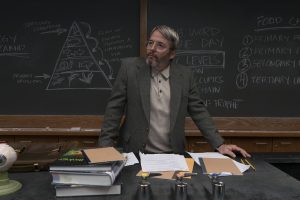 Put-upon community college biology professor Albert (Matthew Broderick) has an additional unexpected challenge to tackle when he’s approached with an unusual request from a Hasidic cantor in “To Dust.” Photo courtesy of Good Deed Entertainment.[/caption]
Put-upon community college biology professor Albert (Matthew Broderick) has an additional unexpected challenge to tackle when he’s approached with an unusual request from a Hasidic cantor in “To Dust.” Photo courtesy of Good Deed Entertainment.[/caption]
To say more would reveal too much, but suffice it to say that this unusual collaboration sparks a strange and comically macabre series of events involving an experiment to chart the decomposition rate of (of all things) a pig, a trip to a “human decomposition farm” and regular visits to a tranquil lakeside location where the cantor believes he’s able to commune with Rikvah’s spirit. Meanwhile, as all this unfolds, others look upon Shmuel and worry, including his sons, who have become convinced he’s in cahoots with a dybbuk; his spiritual leaders, who are concerned that the cantor has become incapable of carrying out his work; and his mother, Faigy (Janet Sarno), who quietly frets that he’s not getting on with his life to find a new wife, showing little interest in the prospective mate (Isabelle Phillips) she’s arranged for him to meet. And, through all this, there’s Albert, who’s increasingly put upon by Shmuel’s requests, including questionably ethical (and potentially illegal) incidents that could threaten his livelihood, career and personal freedom.
However, as this strange odyssey plays out, events unfold that provide surprisingly revelatory insights for all concerned, especially Shmuel. Truly meaningful developments emerge from unlikely events and individuals, providing answers where previously there were none: An impromptu road trip to Tennessee from their home in upstate New York proves remarkably telling, while a chance encounter with a security guard (Natalie Carter) ends up speaking volumes of once-hidden wisdom. And, in the process, the outwardly comical turns out to be richly sublime. Indeed, for those who doubt that the Lord works in mysterious ways, these episodes turn such skepticism on its head. But, then, as long as the unanswered questions finally receive responses, does it really matter where they come from or whether they follow prescribed expectations? After the kind of journey that Shmuel and Albert experience together, they might well say that it doesn’t matter a damn.
Shmuel’s loss is indeed sad. It’s patently obvious how much he loved Rikvah, and his worries about the well-being of her soul after her passing only make that loss that much more painful. He clearly needs to find closure so that he can make peace with her death and get on with his life. But, with relentlessly obsessive thoughts racing through his head and no readily available answers, he’s being tortured by his own mind, a process that carries on and seems to have no resolution. What is he to do?
[caption id="attachment_11354" align="aligncenter" width="350"]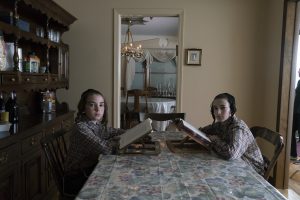 Moishe (Ziv Zaifman, left) and Noam (Leo Heller, right), the young sons of a Hasidic cantor raising them as a single father, worry that their dad may be possessed by a dybbuk when he becomes obsessed with the after-death experience of his late wife in “To Dust.” Photo courtesy of Good Deed Entertainment.[/caption]
Moishe (Ziv Zaifman, left) and Noam (Leo Heller, right), the young sons of a Hasidic cantor raising them as a single father, worry that their dad may be possessed by a dybbuk when he becomes obsessed with the after-death experience of his late wife in “To Dust.” Photo courtesy of Good Deed Entertainment.[/caption]
To a great degree, Shmuel is locked into these circumstances because of his beliefs, which, thanks to the philosophy of conscious creation, serve to shape the reality he experiences, for better or worse. Shmuel’s heavily bought into the beliefs of his religion, many of which follow rigidly prescribed dictates, established limitations that may – or may not – ultimately suit one’s needs or expectations. And, regardless of whether or not he genuinely believes in their validity, he’s expected to adhere to them to maintain his standing with his fellowship. But is that truly feasible?
This is not meant to denigrate one’s religion, but how can one be expected to observe such precepts if one has doubts about them? That’s the conundrum Shmuel quietly faces, especially when he begins having thoughts and dreams that prompt him to question what he’s supposed to accept without reservation. If he needs answers that his faith cannot provide, he must pursue other means to get them, and. if he cannot get past his grief in line within a stipulated timetable, then he must be allowed to give himself permission to move through that process at the pace that best suits him. And this must all happen even if it means risking his acceptance by his religious community.
At the same time, though, despite Shmuel’s courage to get answers in his own way, he still clings to many of the established beliefs he has long embraced. It’s as if he’s trying to dissect the mechanics behind these intangible notions in order to better understand them, despite prohibitions against doing so by the means he employs. He genuinely seems to want to believe in the fulfillment of the expectations he’s long believed in, even if their unfolding does not proceed according to what he has been taught to believe is supposed to happen.
Unfortunately, when faced with such seemingly conflicting circumstances, the result can be maddening, and that can lead to a perilously difficult outcome – obsession. Much of Shmuel’s behavior would seem to fit that pattern, one that grows progressively more consuming over time and that causes the concern expressed by his family and peers. And, once this sets in, it can lock one into an even more restrictive set of limiting beliefs, making escape increasingly difficult.
[caption id="attachment_11355" align="aligncenter" width="350"]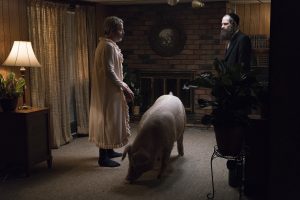 An experiment with, of all things, a pig leads to events spinning out of control for Shmuel, a Hasidic cantor (Géza Röhrig, right), and Albert, a community college biology professor (Matthew Broderick, left), in their quest to study human decomposition rates in the dark comedy, “To Dust.” Photo courtesy of Good Deed Entertainment.[/caption]
An experiment with, of all things, a pig leads to events spinning out of control for Shmuel, a Hasidic cantor (Géza Röhrig, right), and Albert, a community college biology professor (Matthew Broderick, left), in their quest to study human decomposition rates in the dark comedy, “To Dust.” Photo courtesy of Good Deed Entertainment.[/caption]
Several factors contribute to this. In part, Shmuel would seem to be engaged in some heavy-duty semi-conscious creation, an approach to the manifestation process that prevents its creator from recognizing that a desired aspiration has been materialized in principle, even if it doesn’t match the form that was anticipated. If Shmuel were to examine his circumstances realistically, he would discover that the breakdown of Rivkah’s corpse is indeed following its natural course, fulfilling the ultimate expectation, even if it’s not necessarily occurring in line with postulated projections. If he were to see this for what it is, he might be able to rest more easily.
Part of the reason why Shmuel may not be able to see this has to do with the role that doubt and fear can play in thwarting the manifestation process. As conscious creators are well aware, these factors can easily undermine how materializations unfold, largely because they are belief-based notions themselves that can contradict, and subsequently interfere with, the realization of anticipated outcomes. Since Shmuel’s thoughts are riddled with doubts and fears, is it any wonder, then, that his expectations might not achieve fulfillment? And, given that, is it any surprise that this development only leads to more doubt and fear that drives the progression of his obsessive behavior? It really becomes a vicious circle.
There are ways out, though, if Shmuel is willing to consider them. Thinking outside the box to consider the formation of beliefs that surpass limitations can go a long way to overcoming this. This process can be further enhanced in additional ways, such as paying attention to the synchronicities we encounter, those meaningful “coincidences” that seem to be so perfectly tailored to our needs that they can’t realistically be taken as random chance. It can also be aided by listening to our intuition, that quiet inner voice that speaks to us seemingly out of the blue and often doesn’t make sense yet ultimately proves to be spot on. To his credit, Shmuel takes these considerations to heart during the course of his journey, such as when he notices his ability to commune with Rikvah during his visits to the tranquil lakeside locale. Such interactions offer guidance that proves useful, not only in helping him retool his beliefs, but also in coming up with helpful resolutions to his issues.
[caption id="attachment_11356" align="aligncenter" width="350"]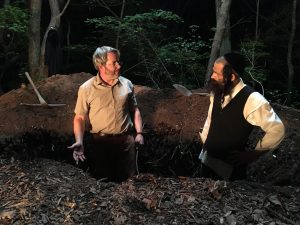 Biology professor Albert (Matthew Broderick, left) and Hasidic cantor Shmuel (Géza Röhrig, right) find themselves in an increasingly questionable spot when they begin an experiment to measure human decomposition rates in the hilariously dark comedy, “To Dust.” Photo courtesy of Good Deed Entertainment.[/caption]
Biology professor Albert (Matthew Broderick, left) and Hasidic cantor Shmuel (Géza Röhrig, right) find themselves in an increasingly questionable spot when they begin an experiment to measure human decomposition rates in the hilariously dark comedy, “To Dust.” Photo courtesy of Good Deed Entertainment.[/caption]
In the end, it’s possible to get past what holds us back, even in such matters as resolving profound grief. The process can be difficult enough to get through based just on the emotional devastation of what has happened, but it can become that much worse when we allow our minds to wander into territory that hinders resolution. But, by looking within and tapping into the beliefs driving all of this, we can at last achieve peace – and make it possible to move forward with our lives.
To be frank, some viewers may look upon “To Dust” as patently appalling or sacrilegious. Its dark humor, admittedly morose subject matter and lampooning of sacred principles might easily offend many. Indeed, there are many moments where viewers might find themselves laughing at things that they probably think they shouldn’t be chuckling about. But, in many ways, those elements are what makes this film work so effectively, especially when the humor is tinged with underlying insights that may not be apparent at first but that are quickly followed by a thoroughly pleasing aftertaste. This unlikely buddy flick grows increasingly hilarious with each passing episode, with Röhrig and Broderick serving up big, unexpected laughs that often prove deceptively profound and sweetly uplifting. This delicious little gem delivers more than what it superficially seems to offer, leaving viewers with good feelings, a warm glow, a tickled spirit and maybe even a new outlook on what comes after this life. For their efforts, screenwriters Jason Begue and Shawn Snyder earned an Independent Spirit Award nomination for their excellent, inspired script.
When we let our expectations get the better of us, they can eat us up more detrimentally than even the most aggressive microbes devouring a corpse. If they go unfulfilled, they can devastate us as they push us into obsessive behavior and frazzled states of mind. But we needn’t remain captives of our thoughts; we can break free and find peace of mind, provided we take the steps to do so – and as long as we take action before we turn to dust.
Copyright © 2020, by Brent Marchant. All rights reserved.
Monday, March 2, 2020
'Love' on The Cinema Scribe
Tune in for the latest Cinema Scribe segment on Bring Me 2 Life Radio, Tuesday, March 3, at 2 pm ET, by clicking here. And, if you don't hear it live, catch it later on demand!

